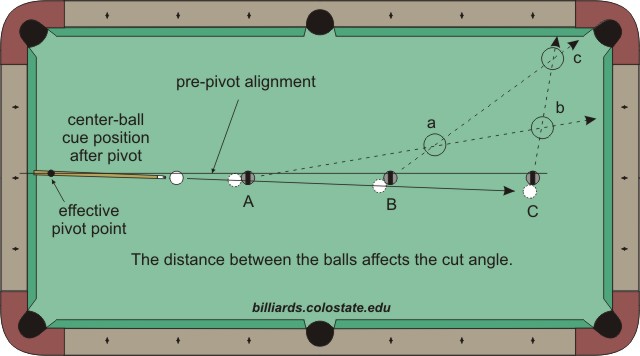Jude Rosenstock said:Well, have you tried using the cueball first?
Oh, Oh, Here they come with the diagrams again. I feel another migrain coming on. Bye guys.
Jude Rosenstock said:Well, have you tried using the cueball first?
That is kind of you.Eric. said:It's never been a "personal" issue between us. You seem like a like-able guy (through your postings). If I met you, I'd probably think you were a good guy, so it's never been a like/dislike issue.
Others and I have responded to this sort of message from you many times over the years. I won't ever again.Eric. said:The only issue I've had is the constant referrals back to your self promotional website, and your disingenuous positioning as a "Pool authority".
Considering Dave asked you the same thing I asked you, it's obvious you're not.Patrick Johnson said:It's obvious to me that we are talking about the same thing. Why are you trying to convince me we aren't?
Patrick Johnson said:There's nothing disingenuous about Dave's "positioning himself as a 'pool authority'". He is a pool authority. He knows more about pool than almost anybody here.
pj
chgo
Patrick Johnson said:There's nothing disingenuous about Dave's "positioning himself as a 'pool authority'". He is a pool authority. He knows more about pool than almost anybody here. Top pool pros know far less than Dave. Are they "pool authorities"?
pj
chgo
dr_dave said:Others and I have responded to this sort of message from you many times over the years. I won't ever again.
Dr. Dave
I could suggest a few things, but some people might think I was un-professor-like if I did.Eric. said:Eric >needs to be an authority on something
dr_dave said:I could suggest a few things, but some people might think I was un-professor-like if I did.Eric. said:Originally Posted by Eric.
Eric >needs to be an authority on something
Yes I do. Thank you for the concern.Eric. said:Nice shot. You feel better? :shakehead:
dr_dave said:Excellent post. I think some people might actually agree with you on this.
Regards,
Dave
Jude,Jude Rosenstock said:Instead of discrediting these systems by proving their lack of mathematical merit, why not examine the opposite? Why is it then these systems are so popular? Are there professional players that use systems? I understand you meant no disrespect to these instructors but truthfully, you paid them no respect and your argument leads the reader to believe these systems simply don't work.
Are top players pool authorities????? Most definitely. They may lack the mathmatics education and technical writing skills needed to clearly express what they know..... JMO, I would wager that they "know" more than Dave, otherwise Daves knowledge would raise his skill set to a level where he would be a world champion himself, barring any physical handicap that would affect his vision or muscle control.Patrick Johnson said:There's nothing disingenuous about Dave's "positioning himself as a 'pool authority'". He is a pool authority. He knows more about pool than almost anybody here. Top pool pros know far less than Dave. Are they "pool authorities"?
pj
chgo
[pros] "know" more than Dave, otherwise Daves knowledge would raise his skill set to a level where he would be a world champion himself
Awesome! I only wish I had read it in a fortune cookie instead.Patrick Johnson said:If you had to do without knowledge or practice, you'd better skip knowledge. But there's no reason to do without either.
Don't you have a science background?
Aren't you another one that knows a ton of theory but doesn't have the skill to "prove/disprove" the theories?
I dont know about you, but I define skill has having the knowledge to to perform a task.Patrick Johnson said:This is probably the most common mistake made on these pool discussion forums. Skill does not = knowledge. Knowledge does not = skill.
If you had to do without knowledge or practice, you'd better skip knowledge. But there's no reason to do without either.
pj
chgo

dr_dave said:Spidey,
I know you were referring to PJ's diagram (from a previous thread), but I wanted to add to the discussion.
Here are the diagrams from my November '08 article that show what happens when you use a fixed pivot without changing your bridge length (see the article for the detailed explanation of the diagram):


Here's a diagram from my December '08 article that shows what happens when you vary your bridge length or effective pivot length (see the article for the detailed explanation of the diagram):

Obviously, to make pivot-based aiming systems work for a wide range of shots you need to vary either your bridge length or your effective pivot length (e.g., by shifting the top of your bridge hand, as you demonstrated in your video). You are correct. A fixed bridge and fixed effective pivot length won't get the job done. I think you are making the exact point I and others have been trying to make all along. The systems obviously work for many people. We are just trying to explain why so they might work for others also.
Regards,
Dave
Jude Rosenstock said:Well Dave, I agree with you on a lot of things. However, there is also a plausible argument FOR systems. Pool isn't just math and physics. It's also psychological. I'm sure you've read that under stress, some people's eye-sight will worsen. The "quiet eye" is difficult to maintain. Even if the system isn't mathematically right, it may help the shooter achieve a quiet eye, especially under stressful situations.
Instead of discrediting these systems by proving their lack of mathematical merit, why not examine the opposite? Why is it then these systems are so popular? Are there professional players that use systems?
Patrick Johnson said:This is probably the most common mistake made on these pool discussion forums. Skill does not = knowledge. Knowledge does not = skill.
If you had to do without knowledge or practice, you'd better skip knowledge. But there's no reason to do without either.
pj
chgo